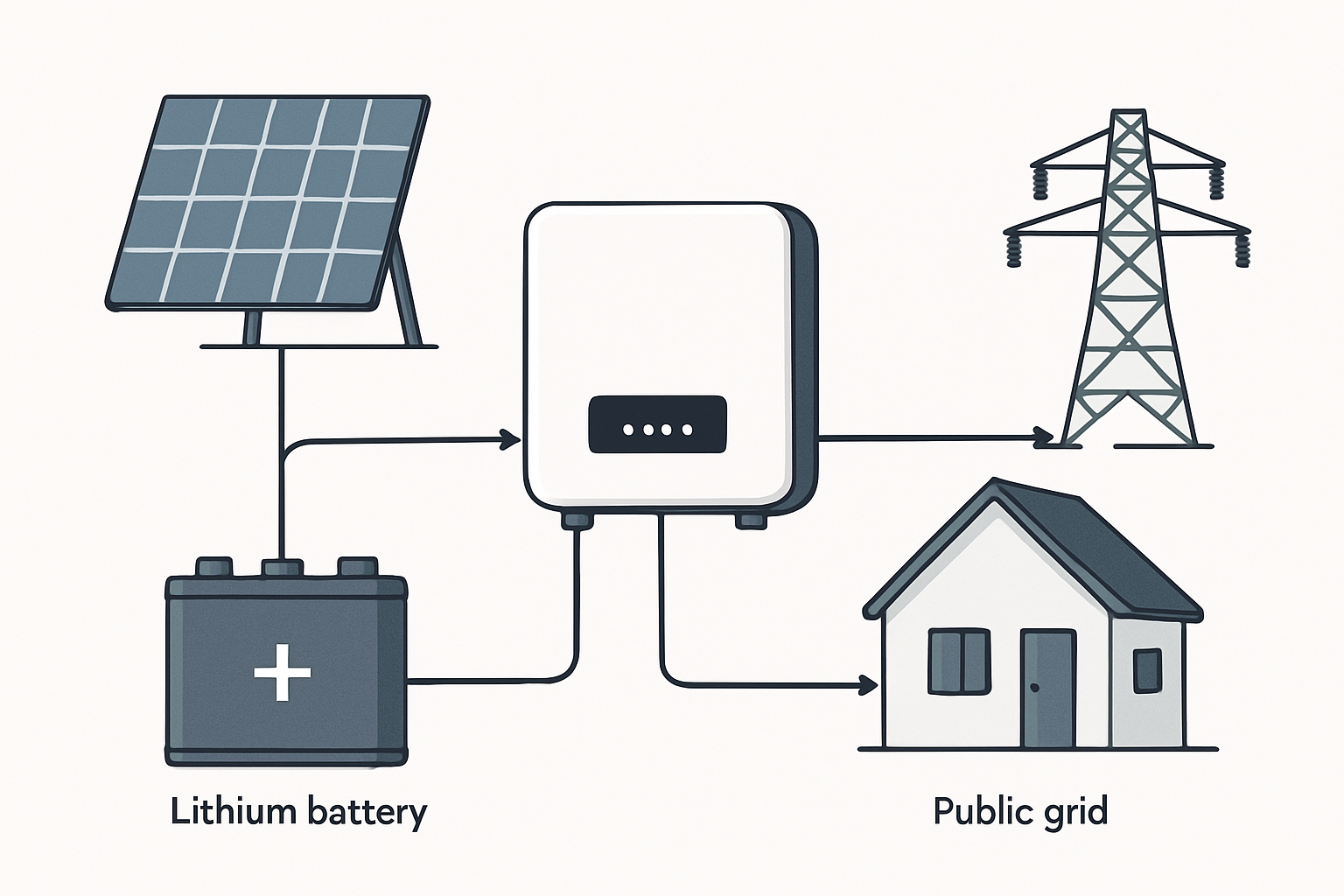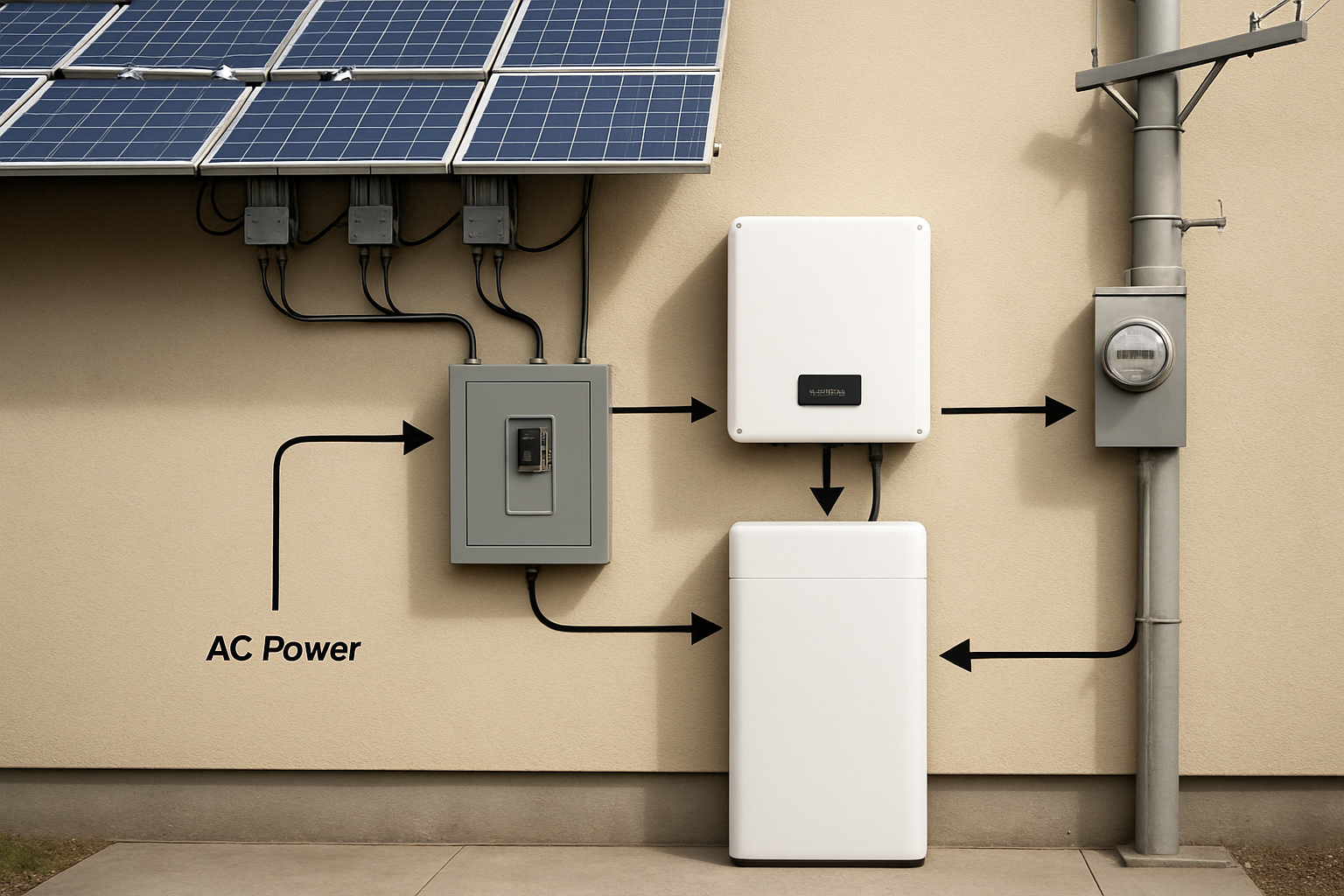Achieving greater control over your home’s power supply is a significant step toward energy security. For homeowners who already have a solar panel system, adding a battery is the logical next phase. An AC coupled home battery system presents a flexible and highly effective solution to store your solar energy, providing reliable backup power and reducing your dependence on the grid. This approach is particularly well-suited for retrofitting storage into an existing solar installation, making it a popular choice for upgrading your home energy capabilities.
What is an AC Coupled Battery System?
An AC coupled battery system integrates with your home's electrical system by connecting directly to the main AC (Alternating Current) panel. This design allows it to work alongside your existing solar setup without requiring a complete overhaul of your components.
The Core Architecture: Independent Power Conversion
In an AC coupled configuration, the solar panels and the battery storage each have their own dedicated inverter. Your existing solar inverter converts DC (Direct Current) power from the panels into AC power for your home. The battery system has its own advanced inverter, often a hybrid inverter, which manages the flow of energy to and from the battery. It converts AC power from your solar array or the grid into DC power to charge the battery. When your home needs power, it converts that stored DC energy back into AC. This separation of tasks makes the system modular and straightforward to install.
How It Differs from DC Coupling
To appreciate AC coupling, it helps to understand its counterpart. In a DC coupled system, solar panels and the battery are connected on the DC side of a single, shared hybrid inverter. This is often efficient for new installations. However, AC coupling provides unmatched flexibility, especially for upgrades. Because it connects to the AC panel, it is compatible with virtually any existing grid-tied solar inverter, allowing you to add storage without replacing your current equipment.
Key Advantages of AC Coupling for Homeowners
Choosing an AC coupled system offers several practical benefits that contribute directly to greater energy independence and system reliability.
Seamless Integration with Existing Solar Systems
The primary advantage of AC coupling is its 'plug-and-play' nature for homes with solar already installed. Since the battery system operates on the AC side, it does not interfere with the existing solar inverter and panel setup. This simplifies the installation process, potentially lowering labor costs and reducing system downtime during the upgrade.
Enhanced System Reliability and Redundancy
Having two separate inverters creates a more resilient energy system. If your solar inverter requires maintenance or fails, the battery system's inverter can continue to function independently. It can still charge from the grid (if desired) and provide backup power during an outage. This redundancy ensures your lights stay on even when one part of the system is offline.
Flexible System Sizing and Expansion
AC coupling allows you to size your solar array and battery bank independently. You can select a battery and inverter combination that perfectly matches your household's energy consumption and backup power needs, without being limited by the specifications of your original solar inverter. This modularity also makes it easier to expand your battery capacity in the future if your energy needs grow.
The Role of the Hybrid Inverter in AC Coupled Storage
The inverter included with an AC coupled battery is the brain of the storage system. Modern systems use powerful hybrid inverters that manage energy flows intelligently.
More Than Just a Battery Inverter
A hybrid inverter in this context is a bidirectional device. It manages charging the battery from either excess solar power or the grid. It also discharges the battery to power your home. Crucially, many hybrid inverters have grid-forming capabilities. During a power outage, they can disconnect from the grid and create a stable, independent AC power source for your home's essential circuits, providing uninterrupted power.
Selecting the Right Inverter for Your System
Choosing the correct inverter is critical. Key specifications include its continuous and peak power output, which determine how many appliances you can run simultaneously. Battery compatibility is also vital, ensuring the inverter works efficiently with your chosen battery chemistry, such as Lithium Iron Phosphate (LiFePO4). According to the U.S. Energy Information Administration, energy storage systems are becoming increasingly important for grid stability, and the efficiency of components like inverters is a key factor in their effectiveness. High-quality inverters maximize the energy you can use from your battery.
Optimizing Your AC Coupled System for Maximum Benefit
Once installed, an AC coupled system can be optimized to deliver significant value, from lowering electricity bills to providing robust emergency power.
Prioritizing Self-Consumption of Solar Energy
Instead of exporting all your excess solar generation to the grid for minimal credit, your system will store it in the battery. As the sun sets, your home will draw from the battery instead of the grid, maximizing the use of your own clean energy. As noted by the U.S. Department of Energy's guide on solar-plus-storage, this can dramatically increase your solar self-consumption and reduce your reliance on your utility provider.
Leveraging Time-of-Use (TOU) Rates
If your utility has Time-of-Use billing, your battery system can engage in energy arbitrage. It can be programmed to charge from the grid during off-peak hours when electricity is cheapest and discharge to power your home during peak hours when rates are highest. This strategic load-shifting can lead to substantial savings on your energy bills.
Ensuring Reliable Backup Power
The most valued feature for many is uninterrupted power during a blackout. An AC coupled system can automatically switch to backup mode, keeping critical loads like refrigerators, lights, and medical devices running. Understanding your battery's capabilities is essential for planning your backup needs. For a detailed analysis of battery metrics like Depth of Discharge (DoD) and C-rating that influence performance, the ultimate reference on solar storage performance provides valuable insights into maximizing your system's lifespan and reliability.
Planning Your Installation
Proper planning ensures your system meets your expectations for performance and cost. A careful assessment of your energy needs and financial options is a crucial first step.
Sizing Your Battery and Inverter
To size your system, start by calculating the energy needs of your essential appliances. This will help determine the battery capacity (measured in kilowatt-hours, kWh) required to get you through an outage. The inverter's power rating (in kilowatts, kW) must be high enough to handle the combined load of these appliances running at the same time.
| Home Appliance | Power (Watts) | Daily Use (Hours) | Energy (kWh) |
|---|---|---|---|
| Refrigerator | 200 W | 8 | 1.6 kWh |
| LED Lights (5) | 50 W | 6 | 0.3 kWh |
| Internet Router & Modem | 15 W | 24 | 0.36 kWh |
| Total Daily Need | 2.26 kWh |
This table illustrates a basic calculation. A professional installer can perform a more detailed load analysis for accurate sizing.
Financial Considerations and Incentives
The cost of a home battery system includes the battery, inverter, and installation. However, various government incentives can significantly reduce this investment. Many countries and states offer tax credits or rebates for installing energy storage. As the International Renewable Energy Agency (IRENA) highlights, supportive policies are crucial for accelerating the adoption of storage technologies that support renewable energy integration. Disclaimer: This content does not constitute financial advice. Consult a qualified financial advisor and professional installer to understand the costs and incentives applicable to your situation.
A Smarter Path to Energy Independence
An AC coupled home battery system offers a powerful, flexible, and efficient pathway to greater energy self-sufficiency. By allowing you to seamlessly add storage to an existing solar installation, it empowers you to store and use your own clean energy on your terms. From increasing self-consumption and lowering energy bills to providing critical backup power during outages, this technology puts you in control of your home's energy future.
Frequently Asked Questions
Can any solar panel system be retrofitted with an AC coupled battery?
Yes, virtually any existing grid-tied solar system can be upgraded with an AC coupled battery. The battery system connects to your home's main electrical panel, making it largely independent of your specific solar inverter model.
How efficient is an AC coupled system?
While there are multiple energy conversion steps, modern inverters are highly efficient. The overall round-trip efficiency—the measure of energy you get out versus what you put in—is typically between 85% and 95% for quality lithium-ion systems. The flexibility and ease of retrofitting often make this a worthwhile trade-off.
What is the lifespan of a home battery in an AC coupled system?
The lifespan depends on the battery chemistry and usage patterns. High-quality Lithium Iron Phosphate (LiFePO4) batteries, known for their safety and stability, generally offer 10 to 15 years of service or between 4,000 and 6,000 charge cycles, depending on factors like operating temperature and how deeply the battery is discharged.





Leave a comment
All comments are moderated before being published.
This site is protected by hCaptcha and the hCaptcha Privacy Policy and Terms of Service apply.